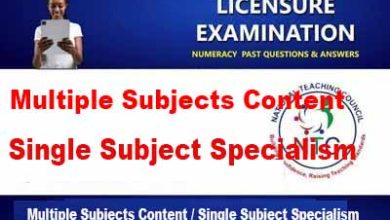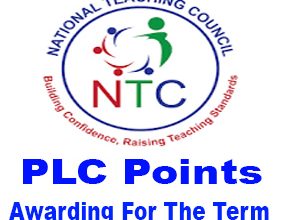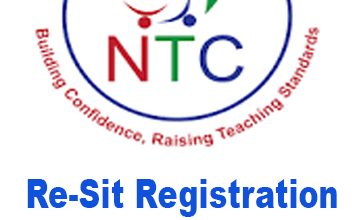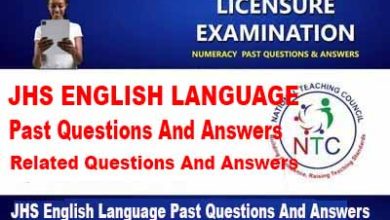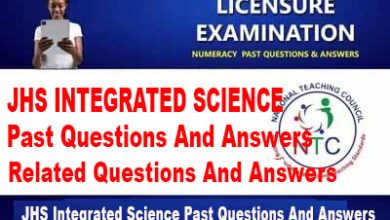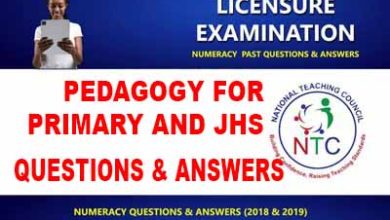NTC Past Question On Essential Skills
Essential Skills Past Question (2020 Essential Skills Past Question)
Download NTC Licensure Exams Past Questions for the previous ntc exams. This includes Sample questions, reading materials, past questions , solved past question and answers, and potential exam questions on ntc numeracy, literacy and essential professional skills exams.
Recommended
Licensure Exams Past Questions PDF Download
Essential Skills Questions and Answers PDF Download
NTC Past Questions & Answers PDF Download
Literacy Questions and Answers PDF Download
Numeracy Questions and Answers PDF Download
(ALL ANSWERS ARE BOLD)
- The concept of teaching the whole child in “philosophy of pragmatism in education” means teaching students to be good
(A) learners
(B) thinkers
(C) scientists
(D) citizens - As people grow older, the __________ of learning declines.
(A) speed
(B) power
(C) quality
(D) quantity - Which from the following should be used to increase correct responses and appropriate behavior by students?
(A) Praise
(B) Reward
(C) Ignorance
(D) Strictness - Which from the following should be used to decrease minor inappropriate behavior by students?
(A) Praise
(B) Reward
(C) Ignorance
(D) Strictness - The book Emile or “On Education” on the nature of education and man is written by
(A) Aristotle
(B) Plato
(C) John Dewey
(D) Rousseau - Different methods of teaching are referred to as
(A) pedagogy
-
CLICK HERE TO ACCESS 2018 ESSENTIAL SKILLS PAST QUESTIONS
-
CLICK HERE TO ACCESS 2019 ESSENTIAL SKILLS PAST QUESTIONS
-
CLICK HERE TO ACCESS 2020 ESSENTIAL SKILLS PAST QUESTIONS
-
CLICK HERE TO ACCESS 2021 ESSENTIAL SKILLS PAST QUESTIONS
-
CLICK HERE TO ACCESS 2022 MAY ESSENTIAL SKILLS PAST QUESTIONS
(B) epistemology
(C) metaphysics
(D) philosophy of education
- Epistemology is the branch of philosophy that deals with
(A) teaching
(B) learning
(C) knowledge
(D) classroom management
- The Law of Effect is a psychology principle that can be effectively used in
(A) accelerate learning
(B) curriculum development
(C) teaching methods
(D) classroom management
- An assessment that is carried out throughout the module of the course is known as
(A) initial assessment
(B) formative assessment
(C) diagnostic assessment
(D) summative assessment
- Which three main capacities “Waldorf Education System” is aimed to cultivate in children?
(A) thinking, planning, acting
(B) thinking, feeling, willing
(C) observing, thinking, analyzing
(D) observing, listing, calculating - The idea of “pragmatism in educational philosophy” tells that education should be about
(A) virtue
(B) obedience
(C) life and growth
(D) shaping good citizens - An aspect of pragmatism is experiential learning that says education should come through
(A) experience
(B) practice
(C) knowledge
(D) observations - Progressivism believes that children learn in a/an
(A) community
(B) competition
(C) isolation
(D) closed environment - The truth of the conclusion of an inductive argument is
(A) certain
(B) experience
(C) observation
(D) probable - Pedagogy is a Greek word which literally means
(A) to understand the child
(B) to guide the child
(C) to educate the child
(D) to lead the child - Pedagogy is the study of
(A) education
(B) learning process
(C) teaching methods
(D) guiding students - The philosopher who worked in mathematical and scientific didactic was
(A) Jean Piaget
(B) John Dewey
(C) Martin Wagenschein
(D) Lev Vygotsky - The use of technology to enhance learning process is called _______ in education.
(A) IT
(B) ICT
(C) Information technology
(D) Communication technology - A scoring guide use to evaluate the quality of students is known as
(A) rubrics
(B) checklists
(C) inventories
(D) rating scales
-
CLICK HERE TO ACCESS 2018 ESSENTIAL SKILLS PAST QUESTIONS
-
CLICK HERE TO ACCESS 2019 ESSENTIAL SKILLS PAST QUESTIONS
-
CLICK HERE TO ACCESS 2020 ESSENTIAL SKILLS PAST QUESTIONS
-
CLICK HERE TO ACCESS 2021 ESSENTIAL SKILLS PAST QUESTIONS
-
CLICK HERE TO ACCESS 2022 MAY ESSENTIAL SKILLS PAST QUESTIONS
- What is meant by “Symposium” in the academic world?
(A) Lecture
(B) Museum
(C) Training
(D) Conference - According to Mark Smith, the first step in the curriculum development is
(A) diagnosis of needs
(B) formulation of objectives
(C) selection of content
(D) selection of learning experiences - Teachers should present information to the students clearly and in interesting way, and relate this new information to the things students
(A) don’t know
(B) already know
(C) willing to know
(D) not willing to know - According to John Dewey, school is a ________ institution, and education is a ________ process.
(A) social, social
(B) social, philosophical
(C) philosophical, philosophical
(D) environmental, psychological - According to John Dewey, schools must prepare students for
(A) present life
(B) future life
(C) entrepreneurship
(D) research - Responses that produce a satisfying effect in a particular situation become ________ to occur again in that situation.
(A) not likely
(B) equally likely
(C) less likely
(D) more likely - Responses that produce a discomforting effect become ________ to occur again in that situation.
(A) not likely
(B) equally likely
(C) less likely
(D) more likely - According to Rousseau, at what age a person ready to have a companion of the opposite sex?
(A) 16
(B) 17
(C) 18
(D) 19 - The field of study concerned with the construction of thought processes, including remembering, problem solving, and decision-making is called
(A) Education
(B) Pedagogy
(C) Cognitive Development
(D) Epistemology
- Jean Piaget proposed __________ stages of Cognitive Development.
(A) 3
(B) 4
(C) 5
(D) 6 - The more often a particular ability is used the __________ it becomes.
(A) more important
(B) less important
(C) stronger
(D) weaker - The longer a particular ability is unused the __________ it becomes.
(A) more important
(B) less important
(C) stronger
(D) weaker - The more parts of your brain you use, the more likely you are to __________ information.
(A) use
(B) miss
(C) misuse
(D) retain - The conclusion of a deductive argument is
(A) certain
(B) experience
(C) observation
(D) probable - The truth of the conclusion of an inductive argument is
(A) certain
(B) experience
(C) observation
(D) probable
-
CLICK HERE TO ACCESS 2018 ESSENTIAL SKILLS PAST QUESTIONS
-
CLICK HERE TO ACCESS 2019 ESSENTIAL SKILLS PAST QUESTIONS
-
CLICK HERE TO ACCESS 2020 ESSENTIAL SKILLS PAST QUESTIONS
-
CLICK HERE TO ACCESS 2021 ESSENTIAL SKILLS PAST QUESTIONS
-
CLICK HERE TO ACCESS 2022 MAY ESSENTIAL SKILLS PAST QUESTIONS
- The process of reasoning from one or more given statements to reach a logically certain conclusion is called
(A) Deductive Reasoning
(B) Inductive Reasoning
(C) Qualitative Reasoning
(D) Quantitative Reasoning - The reasoning in which the given statements are viewed as supplying strong evidence for the truth of the conclusion is called
(A) Deductive Reasoning
(B) Inductive Reasoning
(C) Qualitative Reasoning
(D) Quantitative Reasoning
- According to Jean Piaget, children develop abstract logic and reasoning skill during
(A) Sensorimotor stage
(B) Preoperational stage
(C) Concrete operational stage
(D) Formal operational stage - Children are usually egocentric during __________ and __________ stages.
(A) Sensorimotor, Preoperational
(B) Preoperational, Concrete operational
(C) Concrete operational, Formal operational
(D) Formal operational, Sensorimotor - According to Jean Piaget, children are no longer egocentric when entering
(A) Sensorimotor stage
(B) Preoperational stage
(C) Concrete operational stage
(D) Formal operational stage - According to Piaget’s theory of cognitive development, the Concrete operational stage starts at age
(A) 3
(B) 7
(C) 11
(D) 15 - According to Piaget’s theory of cognitive development, the Formal operational stage starts at age
(A) 3
(B) 7
(C) 11
(D) 15
JOIN NTC EXAMS SESSION 2022 HERE
ANOTHER SET OF QUESTIONS (ALL ANSWERS ARE BOLD)
1. The Department of Education gives greater emphasis on the development of basic skills. What is the philosophical basis for this?
- a. Essentialism
- b. Existentialism
- c. Perennialism
- d. Pragmatism
- Answer: A
2. Teacher M views his students as unique, free-choosing and responsible individuals. All classroom activities revolve around the said premise. What theory underlies this?
- a. Essentialism
- b. Existentialism
- c. Progressivism
- d. Realism
- Answer: B
3. Religious rituals in the classroom and in the school programs prove the deep natural religiosity of the Filipinos. Which philosophy has greatly contributed to the tradition?
- a. Buddhism
- b. Confucianism
- c. Hinduism
- d. Islam
- Answer: B
4. In order to make Roman education truly utilitarian, how should the day-to-day lessons be taught?
- a. Taught in the students’ native dialect
- b. Taught interestingly through the play way method
- c. Related and linked to the events happening in everyday life
- d. Practiced at home under the guidance of their respective parents.
- Answer: C
5. Which influenced the military training requirements among students in the secondary and tertiary levels?
- a. Chinese
- b. Greeks
- c. Orientals
- d. Romans
- Answer: D
6. Which philosophy has the educational objective to indoctrinate Filipinos to accept the teachings of the Catholic church which is foster faith in God?
- a. Realism
- b. Pragmatism
- c. Idealism
- d. Existentialism
- Answer: C
7. Virtue as one component in the teaching of Rizal as a course focuses on the teaching of good and beauty consistent with the good and beauty in God. What philosophy supports this?
-
CLICK HERE TO ACCESS 2018 ESSENTIAL SKILLS PAST QUESTIONS
-
CLICK HERE TO ACCESS 2019 ESSENTIAL SKILLS PAST QUESTIONS
-
CLICK HERE TO ACCESS 2020 ESSENTIAL SKILLS PAST QUESTIONS
-
CLICK HERE TO ACCESS 2021 ESSENTIAL SKILLS PAST QUESTIONS
-
CLICK HERE TO ACCESS 2022 MAY ESSENTIAL SKILLS PAST QUESTIONS
- a. Existentialism
- b. Idealism
- c. Progressivism
- d. Social Reconstructionism
- Answer: B
8. Giving education the highest budgetary allocation, the Philippine government recognizes the possible contribution of its future citizens to the national development goals of the Philippine society. Which stressed this goal of education for social transformation?
- a. Athenian education
- b. Followers of Christ
- c. Greek education
- d. Roman education
- Answer: D
9. The progressivists emphasized the individuality of the child. What is the concern of the reconstructionists?
- a. Experiential learning
- b. Socialization
- c. Social problem
- Answer: C
10. One of the following quotations does not conform to the Christian doctrine of Education for Humanitarianism. Which one is it?
- a. Do unto others as you would like others do unto you
- b. Love they neighbor as thyself
- c. Not on bread alone is man to live but on every utterance that comes from mouth of God
- d. Whatever good things we do to our poor, helpless brothers, we do it for
- Answer: C
-
CLICK HERE TO ACCESS 2018 ESSENTIAL SKILLS PAST QUESTIONS
-
CLICK HERE TO ACCESS 2019 ESSENTIAL SKILLS PAST QUESTIONS
-
CLICK HERE TO ACCESS 2020 ESSENTIAL SKILLS PAST QUESTIONS
-
CLICK HERE TO ACCESS 2021 ESSENTIAL SKILLS PAST QUESTIONS
-
CLICK HERE TO ACCESS 2022 MAY ESSENTIAL SKILLS PAST QUESTIONS
Related Searches
NTC exams past questions, NTC past questions and answers pdf Download, NTC past questions, NTC past questions Download, Essential skills questions and answers, Essential skills questions and answers pdf Download, NTC Literacy questions and answers, Licensure exams past questions PDF Download, Teacher Licensure exams past questions and answers, NTC Numeracy questions and answers pdf Download, NTC Licensure exams past questions PDF Download From 2018,2019,2020,2021,2022,2023, Ntc pedagogy questions, new reforms ntc past questions ntc past questions pdf, ntc reforms sample questions, ntc essential skills past questions, Ntc pedagogy past questions 2023, NTC pedagogy reforms past questions 2023

